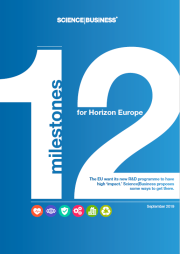The EU want its new R&D programme to have high 'impact.' Science|Business proposes some ways to get there.
Get your free copy

The European Commission is currently drafting a “Strategic Plan” for the first five years of Horizon
Europe, the EU’s next research programme. With a proposed budget of €94.1 billion, it will fund R&D
across a broad swathe of academic disciplines and industry sectors. But while its partially-agreed
legislation lays out the core themes, decisions over the programme’s operational objectives have yet
to be agreed.
During the latter half of 2019, the European Commission is seeking input from academia, industry and
others on what the plan should look like. This report is the contribution of Science|Business and its
network of members in the European R&D community.
The report suggests six high-level impacts – effects to which the programme should contribute – in
each of Horizon Europe’s themed “clusters,” which span the gamut of research disciplines and industry
sectors from medicine to culture. Each impact is accompanied by two suggested milestones: tangible
achievements that an R&D programme can reasonably target, and that would constitute progress
towards the desired impact. That makes 12 suggested milestones in all.
The impacts and milestones suggested here are not meant to be exhaustive. The Commission’s
Strategic Plan will target many more impacts, and there are likely to be many more milestones that
would constitute meaningful progress toward each impact. It will also address wider aspects of Horizon
Europe than the six clusters. Rather than attempt to provide a proposed outline of the entire programme,
this report offers suggestions for thinking about impact, and how to achieve it.
These suggestions follow a consultation of members of the Science|Business Network, with its 60+
universities, companies and public-sector organisations. Ultimately, however, this report is a product
of Science|Business and its staff, applying our policy and news expertise.

 A unique international forum for public research organisations and companies to connect their external engagement with strategic interests around their R&D system.
A unique international forum for public research organisations and companies to connect their external engagement with strategic interests around their R&D system.